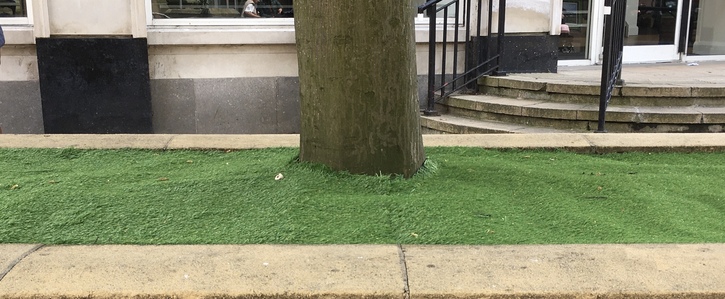500 signatures reached
To: Harrogate Borough Council
Remove the plastic grass and support biodiversity and community.

We demand Harrogate Borough Council prioritise biodiversity and remove the plastic grass from our town planters.
We request local businesses, members of the public, and education settings, to be invited for involvement in community schemes to manage the planters.
We request local businesses, members of the public, and education settings, to be invited for involvement in community schemes to manage the planters.
Why is this important?
The Natural Environment and Rural Communities Act (2006) requires all public authorities to have regard for conserving biodiversity in the exercise of their functions. Planning policies and decisions should minimise impacts on and provide net gains for biodiversity. Artificial grass holds no biodiversity net gains. Burrowing insects, such as solitary bees can’t get past the membrane, and worms beneath the soil are compromised and unreachable by consumers within each habitat community. This is likely to have a negative impact on local bird populations and other consumers, as the food source within the food chain is being reduced and/or removed. Britain’s bees are in trouble with 35 UK bee species under threat of extinction. The implications of this on human food sources, are colossal. We need to be enhancing bee’s habitats and feeding ground, not destroying it. The health of each planter ecosystem is threatened, as a plastic environment is not life sustaining. Though seemingly small, this could have far reaching, negative impact.
Harrogate Borough Council’s Carbon Reduction Strategy highlights the damaging effects of climate change and refers to the UK Climate Change Act 2008, which sets the legally binding UK-wide carbon budget. The removal of living flora has removed carbon sequestration and biodiversity. The use of artificial grass provides no biodiversity benefits, furthermore its production and degradation add to carbon emissions.
Though this artificial grass may be possible to recycle, the financial and environmental costs of this have not been considered. Though it may be long-lasting, the threat to human health via micro plastics washing into local drainage systems; carcinogenic substances present, and possible burn hazards in hotter temperatures, has not been considered.
Key points within the HBC Carbon Reduction strategy include: ‘The council has a corporate responsibility both as a large employer and a community leader to take action to reduce emissions.’ The removal of flora, use of plastic and lack of community consultation and engagement has directly contradicted this point.
Priority 4 states to ‘eliminate all single-use plastic from their premises where possible.’ The use of this plastic grass was completely avoidable. Had the council consulted with the public, many alternative options could have been explored, supporting community involvement and well-being. With much research on nature supporting emotional well-being, and considering the current lockdown and rise in mental health concerns, engaging community with outdoor, nature-based activities should be a priority for our council. We believe in community and unity. Together, we are capable of truly wonderful things. We need a council that works with the community and supports community engagement.
Considering the legally binding aspects mentioned above; biodiversity net gain and carbon reduction should be a priority for our council.
The natural world provides us with water to drink, air to breathe, and food to eat. Everything is linked and everything we do matters. We must protect the environment for moral and economic reasons.
We need more habitats, not more plastic.
Harrogate Borough Council’s Carbon Reduction Strategy highlights the damaging effects of climate change and refers to the UK Climate Change Act 2008, which sets the legally binding UK-wide carbon budget. The removal of living flora has removed carbon sequestration and biodiversity. The use of artificial grass provides no biodiversity benefits, furthermore its production and degradation add to carbon emissions.
Though this artificial grass may be possible to recycle, the financial and environmental costs of this have not been considered. Though it may be long-lasting, the threat to human health via micro plastics washing into local drainage systems; carcinogenic substances present, and possible burn hazards in hotter temperatures, has not been considered.
Key points within the HBC Carbon Reduction strategy include: ‘The council has a corporate responsibility both as a large employer and a community leader to take action to reduce emissions.’ The removal of flora, use of plastic and lack of community consultation and engagement has directly contradicted this point.
Priority 4 states to ‘eliminate all single-use plastic from their premises where possible.’ The use of this plastic grass was completely avoidable. Had the council consulted with the public, many alternative options could have been explored, supporting community involvement and well-being. With much research on nature supporting emotional well-being, and considering the current lockdown and rise in mental health concerns, engaging community with outdoor, nature-based activities should be a priority for our council. We believe in community and unity. Together, we are capable of truly wonderful things. We need a council that works with the community and supports community engagement.
Considering the legally binding aspects mentioned above; biodiversity net gain and carbon reduction should be a priority for our council.
The natural world provides us with water to drink, air to breathe, and food to eat. Everything is linked and everything we do matters. We must protect the environment for moral and economic reasons.
We need more habitats, not more plastic.

